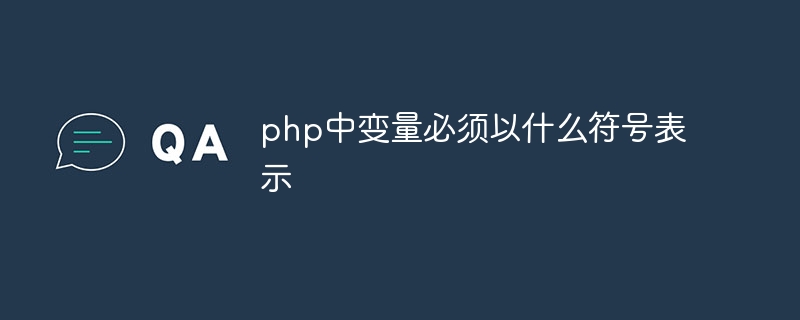What symbols must be used to represent variables in php?
Apr 26, 2024 am 09:45 AMIn PHP, variables are represented by the "$" symbol, which is a traditional convention that distinguishes variables from other language elements. When declaring a variable, just add the "$" symbol before the variable name, such as "$name = \"John Doe\"; $age = 30;". Variable naming rules include: starting with a letter or underscore, containing letters, numbers, and underscores, not containing spaces, not being reserved words or PHP function names, and being case-sensitive. PHP variables do not need to be declared and can contain any data type.

Variable representation symbols in PHP
In PHP, variables must be represented by the "$" symbol.
Why use the "$" symbol?
- The "$" symbol is the traditional representation of variables in PHP, dating back to early versions of the language.
- It helps distinguish variables from other language elements such as constants and functions.
- It is a well-known and widely used convention in PHP, so it is easy to learn and remember.
How to declare variables?
To declare a PHP variable, just use the "$" symbol followed by the variable name. For example:
$name = "John Doe"; $age = 30;
Variable naming rules
PHP variable names must follow the following rules:
- Must start with a letter or an underscore.
- can contain letters, numbers and underscores.
- cannot contain spaces.
- No reserved words or PHP function names.
Note:
- Variable names are case-sensitive. For example, "$Name" and "$name" are different variables.
- PHP variables do not need to be declared before use.
- PHP variables can contain any data type, including strings, numbers, Boolean values, and arrays.
The above is the detailed content of What symbols must be used to represent variables in php?. For more information, please follow other related articles on the PHP Chinese website!

Hot Article

Hot tools Tags

Hot Article

Hot Article Tags

Notepad++7.3.1
Easy-to-use and free code editor

SublimeText3 Chinese version
Chinese version, very easy to use

Zend Studio 13.0.1
Powerful PHP integrated development environment

Dreamweaver CS6
Visual web development tools

SublimeText3 Mac version
God-level code editing software (SublimeText3)

Hot Topics
 11 Best PHP URL Shortener Scripts (Free and Premium)
Mar 03, 2025 am 10:49 AM
11 Best PHP URL Shortener Scripts (Free and Premium)
Mar 03, 2025 am 10:49 AM
11 Best PHP URL Shortener Scripts (Free and Premium)
 Working with Flash Session Data in Laravel
Mar 12, 2025 pm 05:08 PM
Working with Flash Session Data in Laravel
Mar 12, 2025 pm 05:08 PM
Working with Flash Session Data in Laravel
 Simplified HTTP Response Mocking in Laravel Tests
Mar 12, 2025 pm 05:09 PM
Simplified HTTP Response Mocking in Laravel Tests
Mar 12, 2025 pm 05:09 PM
Simplified HTTP Response Mocking in Laravel Tests
 cURL in PHP: How to Use the PHP cURL Extension in REST APIs
Mar 14, 2025 am 11:42 AM
cURL in PHP: How to Use the PHP cURL Extension in REST APIs
Mar 14, 2025 am 11:42 AM
cURL in PHP: How to Use the PHP cURL Extension in REST APIs
 Build a React App With a Laravel Back End: Part 2, React
Mar 04, 2025 am 09:33 AM
Build a React App With a Laravel Back End: Part 2, React
Mar 04, 2025 am 09:33 AM
Build a React App With a Laravel Back End: Part 2, React
 12 Best PHP Chat Scripts on CodeCanyon
Mar 13, 2025 pm 12:08 PM
12 Best PHP Chat Scripts on CodeCanyon
Mar 13, 2025 pm 12:08 PM
12 Best PHP Chat Scripts on CodeCanyon









